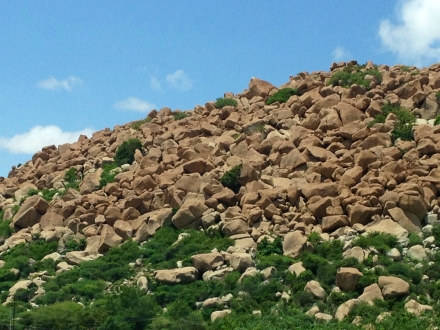
Boulders by @daskoel // CC BY-NC-ND 2.0
David Galler is the fifth and last of the poets I discovered in volume 21 of the Quarterly Review of Literature, the first in its poetry series. To judge by the collection of epigrams included halfway through these Third Poems: 1965-1978, at this time Galler considered himself rather embattled, a lone traditionalist amid a sea of unappreciative radicals. Forty years later the writerly politics are of little interest to me, but I do like most of the poems, although I find it difficult to sort out why. Many of his poems read very easily, and they are often so clever in their twists upon the classical that I find myself enjoying them almost in spite of myself — but they do not go beyond the cleverness for me, I do not have that sense of being lifted into another way of seeing or being. Others of the poems express some thought I have been struggling to articulate, and thus touch me very deeply, but I cannot judge if the power is in the poem itself or in my own recognition of something I have always been unable to say. Poems such as that I might share with a lover to express myself, but I would not select them as examples of fine work; I am simply too close to judge.
Here is one of the clever ones:
Sisyphus
How many times I’ve tried
To say just what it is
I’m doing with this rock.
Exhaustion, hope, despair
Are things I’ve talked about,
And irony or prayer,
Or how I’ve held this rock
To be a part of me.
I think I’ve learned enough
To say it’s just a job.
Each day brings changes, but
Ultimately not much:
Working the damned thing up
Takes what it takes, but then —
To watch it teeter, hear it
Thunder, all that anger
Grinding down the slope!
You don’t, as the god said,
Get something for nothing. No.
I do enjoy the execution of the idea, the modern twist upon the classical figure, but it does not touch me emotionally. This next one, on the other hand, does much more; when I read it I both feel the image in my body and see a piece of the world new.
The Root
We are similar,
Air-traveler.
Think what it is —
To be surrounded
On all sides by ground,
To feel the press
Of earth on every pore,
And to move blind
Along each way one finds,
Unblocked
Even by rock.
Then, struck afar
(As in another life),
To tremble at one’s tips;
To feel them each at once;
Not know the shape one is,
Nor nature of what affronts.
Towards the end of the collection come my favourite poems, unfortunately far too long to quote in full. In “Theseus Drunk” the Athenian King looks back upon “the marvelous damned mess made of my life,” considering how “whatever I do / Wherever, I’m called a hero” and what that means. The use of language is superb; I can read the poem quickly, caught up in the motion of a drunken man’s rush of confession, but when I slow down and really attend to the words I can see how controlled it is, how the vowels echo one another, how that word hero is repeated and played upon all through to the very end. “Sanctuaries” is the voice of Iphigenia in Aulis, priestess in a strange kingdom, speaking of her childhood in Agamemnon’s court, a place “in which / Incentive led forever / To despair.” Both of these are marvellous, and luckily the first one has been collected in another volume, although the second one appears to have fallen out of the poet’s favour — perhaps I will post it sometime despite the length, I hate to think of it being unavailable to a curious reader.
